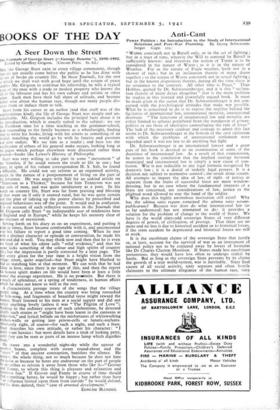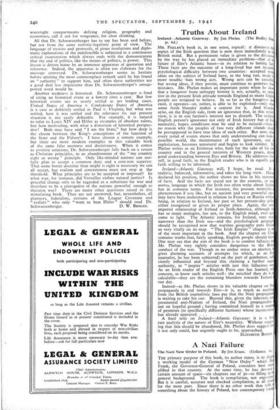Anti-Cant
Power Politics : An Introduction to the Study of International Relations and Post-War Planning. By Georg Schwarzen- berger. ;Cape. zis., " WARRE consisteth not in Battell only, or in the act of fighting ; but in a tract of time, wherein the Will to contend by Battell is sufficiently known: and therefore the notion of Times is to be considered in the nature of Warre ; as it is in the nature of Weather. For as the nature of Foule weather, lyeth not in a shower of rain ; but in an inclination thereto of many dayes together ; so the nature of Warre consisteth not in actual fighting ; but in the known disposition thereto, during all the time there is no assurance to the contrary. All other time is Peace." Thus Hobbes, quoted by Dr. Schwarzenberger, and it is this " inclina- tion thereto of many dayes altogether " that is the main problem he studies in this learned and powerfully argued book. It must be made plain at the outset that Dr. Schwarzenberger is not con- cerned with the psychological attitudes that make war possible. What he is concerned to do is to expose the realities behind the fig leaves of international law, international morality, international decorum. " The functions of international law and morality are either limited to spheres peripheral from the standpoint of power- politics or are those of ideologies camouflaging the rule of force." The lack of the necessary candour and courage to admit this fact seems to Dr. Schwarzenberger at the bottom of the easy optimism with which the problems of international settlement were regarded until it was too late to do anything but fight.
Dr. Schwarzenberger is an international lawyer and a great part of his book is devoted to an examination of some of the doctrines of international law. As a result of that examination, he comes to the conclusion that the implied analogy between municipal and international law is simply a new cause of con- fusion. War is not reducible to any legal formula recognised by domestic law ; it is a denial of orderly legal process. It is a decision not subject to normative control ; the result alone counts. All attempts to import the idea of law, of right, of justice as separate from the fruits of successful force are mere window- dressing, but in no case where the fundamental interests of a State are concerned, are considerations of law, justice or the plighted word allowed to stay the hand of the soldier. Why does this highly anomalous institution still exist? Why has the ultima ratio regum remained the ultima ratio rerum- publicarum? Because war does do what international law (as so far understood) has not attempted to do: it provides a solution for the problem of change in the world of States. We have in the world sixty-odd sovereign States of very different degrees of power, of civilisation, of prestige. That there are no more and no less is due to historical accident or to historical forces, if the term accident be deprecated and historical forces are still at work.
It is the exorbitant claims of the sovereign State that justify or, at least, account for the survival of war as an instrument of national policy not to be conjured away by lovers of formulas like Dr Charles Clayton Morrison. If States made less exorbitant pretensions, they would have less often to undergo ordeal by battle. But as long as the sovereign State prevents by its claims the growth of a true world-system, war is inevitable. Sixty final causes of all• social activity, sixty separate and often hostile claimants to the ultimate allegiance of the human race, sixty watertight compartments defying religion, geography and economics, call if not for vengeance, for clear thinking.
All that Dr. Schwarzenberger has to say has been said before, but not from the same realistic-legalistic point of view. The language of treaties and protocols, of pious resolutions and diplo- matic explanations of the indefensible is subjected to a continuous critical examination which always ends with the demonstration that the end of politics, like the means of politics, is power. This lesson is driven home by an immense apparatus of quotation and reference. Indeed, the apparatus is often too elaborate for the message conveyed. Dr. Schwarzenberger seems to hesitate before uttering the most commonplace remark until he has found an " authority " to support him, and often these authorities are a good deal less impressive than Dr. Schwarzenberger's unsup- ported word would be.
Another weakness is historical. Dr. Schwarzenberger is fond of citing an historical event as a lawyer cites a case. But few historical events are as neatly settled as are leading cases. United States of America v. Confederate States of America is a case as definitely settled as Paul v. Virginia, but what was settled, how it was settled and the relevance for our present situation is not easily definable. For example, it is natural to refer to Louis XIV and Hitler as examples of absolute rulers, but how misleading, with what a distortion of historical perspec- tive! Both may have said " I am the State," but how deep is the chasm between the King's conceptions of the function of the State and the Fiihrer's. I have chosen a remote example, but there are more modern examples in this valuable book of the same false neatness and decisiveness. When it comes to positive solutions, Dr. Schwarzenberger falls back on a return to Christian principles, to an abandonment of the " my country right or wrong " principle. Only like-minded nations can use- fully plan to accept a common duty and a common superior. That some better doctrine than might is right is necessary we can all accept, but realism and concreteness must not stop at the threshold. What principles are to be accepted or imposed? In what way, for instance, did Versailles violate natural justice? Js peaceful change only to be regarded as a substitute for war and therefore to be a prerogative of the nations powerful enough to threaten war? There are many other questions raised in this stimulating book. They are not answered, but, nevertheless, all planners, federalists, revisers of the League Covenant and realists " who only " want to beat Hitler " should read Dr.



























 Previous page
Previous page